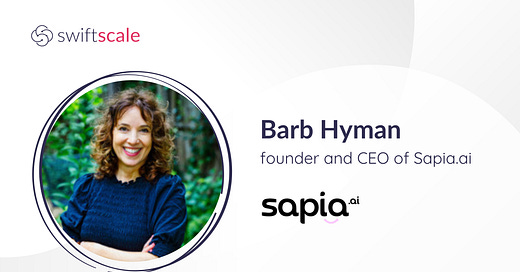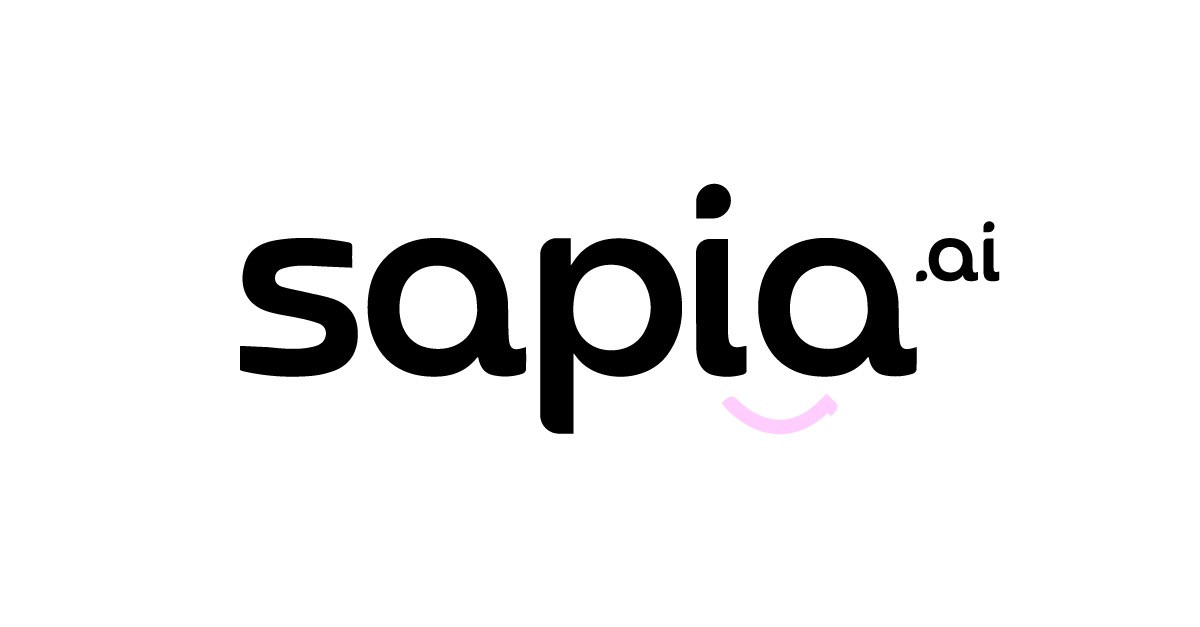Founder in Focus: Barb Hyman, Sapia AI
We sit down with Barb Hyman, founder and CEO of Sapia.ai, a smart interviewer that finally makes hiring inclusive, efficient and effective for candidates AND companies.
Endless cover letters, impersonal forms and gruelling interview marathons have turned the hiring process into a soul-sucking ordeal.
Not only is the process demoralising for candidates, but it’s also a costly time-sink for employers. To make matters worse, a lot of the time, it doesn’t even result in the right people being hired.
It feels like a solution has been a long time coming, which is why we were so excited to talk with Barb Hyman, founder and CEO of Sapia. We spoke about her founder journey, the factors that have contributed to her success and why Sapia is changing the hiring game for candidates and organisations.
About Sapia.ai:
Founded in: 2018
Employee count: 51-100
HQ: Melbourne, Australia
Current funding stage: Series A
Total funding to date: $11.3 million
Traditional hiring relies on CVs and human-led interviews as the key deciders, yet the process is filled with human biases. Sapia.ai is transforming the hiring process for both candidates and organisations making it a fairer, easier, faster and smarter experience.
Sapia.ai’s Chat Interview™, automates screening, assessing, and interviewing in 10 languages and has completed over 4m interviews in over 47 countries. They have a proprietary Machine Learning System built on the largest proprietary data set of its kind (18mil interview Q&A pairs and 1.7bn words). They're trusted by 56 enterprise customers globally, such as Qantas, Starbucks and Woolworths, to find the people that belong with their brands.
They even helped Holland & Barrett hire for potential over experience, resulting in happier, more engaged employees who stay longer.
The interview
We always start by asking founders or operators “why this?”, “why now?” and “why you?” Answers to these questions peel back the lid on what makes founders tick, why their solution will succeed and ultimately, why you should care.
Why now?
Barb Hyman: The biggest hidden cost within your business is hiring. If you listen to any founder talking about their pains, hiring is one of them.
Recruitment is broken. It has been for decades. It's a very inhumane experience for anyone applying for a job. Having been a CHRO, I could also see at an organisational level that it was broken.
Traditional assessment is more inhuman than all job applications. When you're asked to respond to questions like, “Would you rob a bank if you could get away with it?”, what's the right answer?! Some questions feel like they don't relate to any job. They don't speak to people, they don't give them agency. The wonders of Natural Language Processing meant that we could employ this new science to reimagine the science of people.
Every organisation needs to hire, but the way they do it is deeply subjective and therefore flawed. It risks bias and lacks any kind of data. The most consistent data set that people use is what sits in a resume, but no one's time is served well by reading a resume. Resumes are even less relevant today than they were pre-GPT because now anyone can fabricate a great resume.
“Traditional assessment is more inhuman than all job applications. When you're asked to respond to questions like, “Would you rob a bank if you could get away with it?”, what's the right answer?!”
Why this?
This isn't a new problem, but people have previously turned to solutions that solve for the hiring side. The hiring manager might get people in the door faster or be able to make a decision faster, but they don't solve for the candidate.
Candidates are your customers. For many companies, they’re rejecting in six figures, and there's a potential risk of revenue loss if candidates turn away from your business. Candidates are your viral voice, so you want to leave them with a really great impression. You want them to be wanting to get the job, even if they didn't get the job, because they had such an incredible experience.
That's what we do. We've reimagined what it feels like to apply for a job and make decisions for your team.
Why you?
I don't think that what we've built could have been built by a traditional assessment firm. It had to be built by people with a very different perspective, who brought fresh eyes.
I think innovation comes from the intersection of differences. The combination of my perspective as an HR leader and the empathy (coupled with frustration!) that I have for HR, together with someone who had the brains to be able to build it, our data scientist, has created what we have today. I don't think we would have this if we came from traditional backgrounds.
I bring a particularly progressive, provocative view around HR. HR is really famous for doing business with itself. I think it needs to be replaced by tools that give agency to people, instead of HR trying to architect everything. So I'm prepared, and credible enough, to challenge this sector.
“I think innovation comes from the intersection of differences.”
Tell me about your team
When I think about our team, particularly the early team members, which we call Founders, there's a quality of not-enoughness, of being relentless. It comes from our own stories. Mine comes from being an immigrant, my mother dying at a young age and wanting to be very independent as the third member of four kids. For Buddhi, my co-founder, it comes from his story of being an immigrant and having a name that no one can pronounce and not being able to get a job.
At BCG, we used to talk about the insecure overachiever profile and I call it the not-enoughness in the startup world. The, I'm-going-to-prove-you-frigging-wrong.
“At BCG, we used to talk about the insecure overachiever profile and I call it the not-enoughness in the startup world. The, I'm-going-to-prove-you-frigging-wrong.”
What other factors have contributed to your business's success?
We've made some really good strategic decisions along the way, and bad ones as well. A great decision we made early on was that we were going to be a data company. So, we invested in prospects that would give us a lot of data to build our moat. In the early days, pre-GPT, until fairly recently, our board would say, isn't there diminishing returns from data? Do you really need more data? No one appreciated, from an investment perspective, the value of this data asset that we've got.
Now, everyone understands that if you're just building your models from open-source data, there's nothing really moat-like around that. But, if you can layer on a proprietary data set that understands a certain context onto a generative AI model like Claude, you have something that no one else has and there's huge value in that.
Another good decision we made was to go after consumer brands. We didn't have any marketing budget and we still don't have much, so we thought that if we could build our own brand off the brands of our customers, that would generate its own virality and awareness. Being able to say that we serve the most trusted consumer brands in Australia, and increasingly in the UK, creates its own pipeline of opportunity. The thing about any truly transformative technology is that you're making heroes out of your clients. They then feel comfortable to share that amongst their network. Who doesn't want to be promoted off the back of a transformative piece of strategy within their team!
“The thing about any truly transformative technology is that you're making heroes out of your clients.”
What have been the biggest challenges you've had to overcome?
We embarked on a strategy of trying to build a new category, because we are a new category, and that didn't work. You need a lot of money and you need really good brand marketing people to do that and you need to be really consistent.
What people buy is a solution to their problem, not a product. When Steve Jobs went out and talked about the iPhone and he said this is something that's going to perform three tasks in one, people could relate to that. Wow. Now I don't need to carry around a phone and a camera and a Walkman, I can just carry this around.
We tried to adopt the same approach and say we’re a screening, we're an interview, we're feedback, we're insights, but, people don't buy like that in the B2B world. Enterprise solution selling is very bespoke. So that's one thing we learned, that it's really hard to create a category! The other is that you've got to really be obsessed with the pain and identify the pain.
I had many conversations with companies who were really curious about this tech, but then it didn't go anywhere because we opened the kimono way too quickly before really validating that there was real business pain that would justify us going on a journey together.
Businesses that don’t know what their cost to hire is. Nine out of ten companies don't know that. They often don't even know how long it takes to hire. So, despite the huge investment in Applicant Tracking Software and Human Resources Services with data, there is still an absence of data at their fingertips about even knowing how to measure.
How do we know if we're doing a good job in hiring? How do we measure that? Are we looking at those metrics on a regular basis? So often we’re helping to build the business case from the ground up because they haven't done that work.
We'll pass on opportunities because we don't think they're ready. If they don't have the maturity in terms of their own processes, if they don't have a leader. It takes leadership to drive change. If we don't feel like we've got someone in the sponsor seat who's a true leader and wants to be a fast follower from an organisational perspective, we'll pass on that opportunity. In the early days, we took everything, now we're much more selective.
“It takes leadership to drive change. If we don't feel like we've got someone in the sponsor seat who's a true leader and wants to be a fast follower from an organisational perspective, we'll pass on that opportunity.”
What advice would you give your younger self if you were starting out again?
I would choose the board really wisely. I underestimated the role of the board and the importance of choosing people who were the right fit. It's like hiring. What do you need and how do you measure for that? I would also trust my own counsel a lot more.
I think I had this sort of deference to board members, thinking that they've been around a long time and they know this stuff. In fact, no one knows the business and the space better than me.
Which founders or startups are you inspired by right now?
I listen to a lot of podcasts, so there's not one in particular. I do think what Slack did and the way they went about it is really admirable and Stuart Butterfield just seems like a really interesting guy. I also love Des Trainer, the co-founder of Intercom.
We matchmake founders, investors and executives and it’s the quality of our network that sets us apart.
Want to join this exceptional network? Want us to help matchmake you?
Join the network
Get in touch: hello@swiftscale.co






